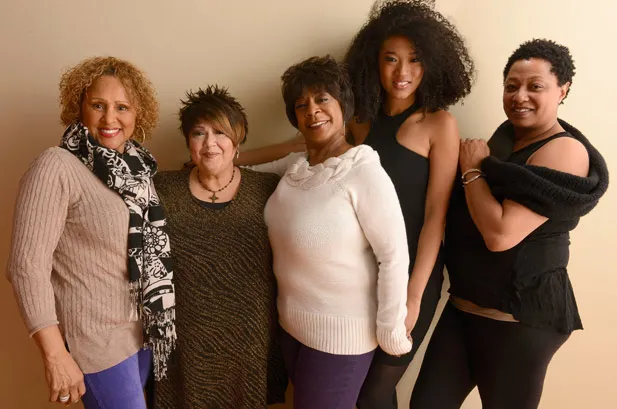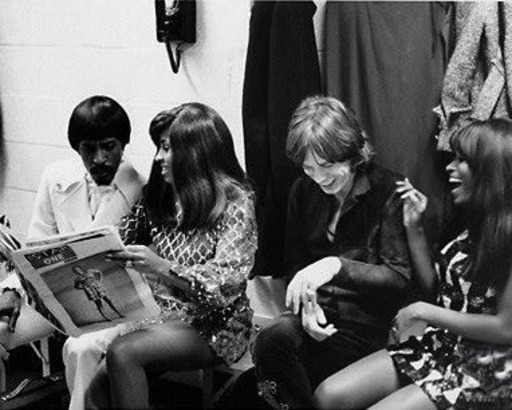The highlight of what I saw of last night’s Oscars was Darlene Love singing “His Eye Is on the Sparrow” as she joined the makers of 20 Feet From Stardom to accept the Academy Award for Best Documentary. I saw the film last summer at Amherst Cinema, and here’s what I wrote. Morgan Neville’s powerful documentary runs the emotional gamut in focusing on the lives of backup singers Darlene Love, Merry Clayton, Claudia Lennear, Lisa Fischer, Tata Vega, Judith Hill, and others who’ve made their mark on recordings by Ray Charles, Ike & Tina Turner, The Rolling Stones, Otis Redding, Joe Cocker, George Harrison, Tom Jones, Bruce Springsteen, Michael Jackson, Sting, and countless others. As Love asserts, backups often sing the hooks and harmonies that make these tunes hits, and it’s their parts that listeners tend to sing along with and remember best. For that alone, they should be better known.

Love proves to be a stirring source for Neville. The story she relates of working for Phil Spector epitomizes the struggle faced by many of these singers, and to hear her tell it is especially poignant. She quit the biz altogether in the wake of a Spector double-cross, but it was hearing her 1963 Philles Records classic “Christmas (Baby Please Come Home)” on the radio while she was working as a house cleaner in the early 80’s that spurred her return to action. “My life has been all about trying to make a success of the gift that I have,” she reflects.
Love’s story adds a measure of triumph to the mixed-bag of ups and downs related in Twenty Feet. Since 1986, her annual appearance singing “Christmas” on Late Night with David Letterman has been for millions the real curtain-raiser on the Yuletide season. Love, who sang with The Blossoms and was the actual, though uncredited lead singer on a pair of mega-hits by The Crystals, was elected to the Rock’n’Roll Hall of Fame in 2011.

By contrast, there’s Claudia Lennear, the onetime Ikette who sang with George Harrison at The Concert for Bangladesh and toured with the Rolling Stones, David Bowie, and Joe Cocker; cavorted with Mick Jagger; posed for Playboy; and was reputedly the inspiration for “Brown Sugar.” The Providence native now teaches Spanish in a Learning Assistance Center in Los Angeles and recently said that she’d like to sing with the LA Philharmonic Master Chorale. Lennear’s dedication to community service helps her take it in stride, though she appears bemused over what was and is no longer, and admits in a feature article in PopMatters that appearing in the film brought up “situations and events” that she’d “put on the back burner…and repressed.” Now in her early 60’s, she looks great and sounds as beautiful as ever.
Of her 20 Feet co-stars, Lennear told Pop Matters, “Merry and I used to do background sessions together...Lisa Fischer is just phenomenal. She’s just one of the best singers I’ve ever heard. I’ve always admired Darlene Love’s music and her voice. She’s another one of those heroes from back in the day. I didn’t know until this film that she was the voice of the Crystals. I used to buy their records left and right! I got really emotional because a lot of the things that she was saying about the Phil Spector days just brought it all home to me about the Ike Turner days. He would pick our brains for ideas. We’d come up with lines for a song and then he would take off. We never got paid for any of that but I think that was the culture at that point. For all of the wonderful and rich experiences I did get from Ike Turner, I sort of just dismissed it. It’s over now. It’s part of the past but it helped me connect with Darlene’s situation.”
Merry Clayton’s voice-cracking octave leap on “Gimme Shelter” is one of the most famous contributions that any of these ladies has made to a hit recording, and it’s a gas seeing her and Jagger listening to this isolated track of her unforgettable declamation, “Rape, murder…It’s just a shot away!” But it’s preceded by a false note as Clayton recalls the late night call she received asking her to come promptly to the L.A. studio where the Stones were recording. In the movie, she feigns not knowing who they were. “The Rolling what?” she recalls wondering, much to the tittering amusement of the Amherst audience. While I’ve never had any trouble believing that Muddy Waters was genuinely unaware when he introduced (at his manager’s insistence) Bob Dylan as “our good friend, John Dylan,” at the Bottom Line back in the day, it’s incredible to think that Clayton, who’d been singing on major pop records since 1962, didn’t know of the Stones by ‘69.

20 Feet also leaves uncontested the spurious notion that Clayton failed to enjoy success as a solo artist because the industry had room for only “one Aretha.” The film includes a complete performance by Merry and her band from around the time that hit-maker Lew Adler produced three LP’s on her in the mid-70’s. The footage makes for wonderful time-capsule material, but it hardly supports the idea that she was in Aretha’s league. Clayton’s renown is secure as a background singer, and while the bread’s a lot lighter than what the headliners take home, there’s no shame in it.
Just ask Mable John, the former Raelette who recorded as a solo artist for Motown and Stax in the 60’s before turning to gospel music and church ministry in 1976. Mable’s a proud, centering force in 20 Feet, a lady with no regrets and a deep sense of conviction that she’s used her voice in the very spirit in which it was nurtured. But speaking of Raelettes, I missed hearing anyone mention Margie Hendricks. The prototypical backup, Margie’s the gal who laid it on the line in “Hit the Road, Jack;” got a chorus to herself, and a shout out from Ray, on “Night Time Is The Right Time;” and was with the Raelettes on “What’d I Say.” In 20 Feet From Stardom, Stevie Wonder, a generous source throughout, sings the “Hey…, Ho…, You make me feel so good…,” of Ray’s 1959 classic without accompaniment. Stevie’s unanswered calls underscore all you need to know about how essential the backups are, even from twenty feet away.